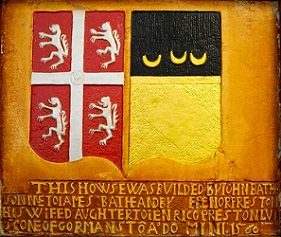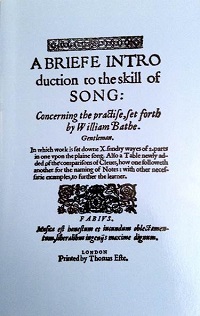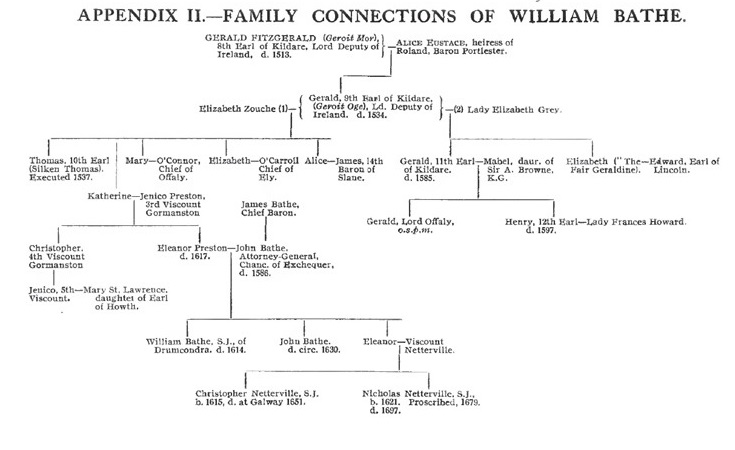Life
1564-1614 [Lat. P. Guilielmus Batheus]; b. 2 April, Drumcondra Castle, Co. Dublin, son of John Bathe, Chancellor of the Exchequer of Ireland (d.1586) and Eleanor [nee Preston, dg. of 3rd Viscount of Gormanstown]; g-s. of James Bathe, Chief Baron of the Irish Exchequer; ed. at Oxford, where he studied languages and music; d. Madrid; issued Brief Introduction to the Art of Music (1584); studied law at the Inns of Court, London; became a favourite of Queen Elizabeth to whom he presented a harp; received grants of land extending the Bathe holdings;
lost favour in 1598 when he entered the priesthood; converted to Catholicism and entered Jesuit novitiate at Tournai [where he entered a brief notice of his life], c.1596; studied for the priesthood at Louvain and Padua; entered the Society of Jesuits, 1601; appt. rector of Irish College at Salamanca; last visited Ireland in 1601 and passed his inheritance to his younger br. John, who served as the ambassador in Madrid[?]; he issued Janua Linguarum (1611), a system for teaching language using pictures which much translated into continental languages. RR ODNB
[See Bathe Family Tree - infra. ]
| An Irish humanist: |
|
 |
| Bathe Family Arms |
[ top ]
Works| Janua Linguarum |
|
| Sundry |
|
[ top ]
 |
[ top ]
Criticism
|
[ top ]
Bibliographical details
Rev. T. Corcoran, S.J., ‘William Bathe, SJ., of Dublin (1564-1614) and His Method of Language Teaching’, in Studies in the History of Classical Teaching - Irish and Continental 1500-1700 (Dublin & Belfast: Educational Co. of Ireland 1911) [Chap. I: The Author of the Janua Linguarum, &c.; Chap. II: Collaborators on the Janua Linguarum; Appendix I: Biographical Articles on William Bathe published by Tanner, at Prague 1694 [see full-text copy - as attached].Seán P. Ó Mathúna, An tAthair William Bathe, C.Í., 1564-1614: Ceannródaí sa Teangeolaíocht (Baile Atha Cliath: Oifig an tSolathair 1980), and Do., trans. as William Bathe, S.J., 1564-1614: A Pioneer in Linguistics [Studies in the Theory and History of Linguistic Science, 3] (Amsterdam: John Benjamins Publ. Co. 1986), 68pp. [Contents, i.e., chaps.:] 1. William Bathe’s ancestral background; 2. William Bathe, 1564-1614: Courtier, diplomat and Jesuit; 3. A bilingual system: the different editions of Ianua Linguarum; 4. Ianua Linguarum: English translation of preface to 1611 edition' 5. Ianua Linguarum: the historical and educational setting; 6. Musical and theological writings; Appendices; List of Manuscripts' Bibliography; Index; Genealogical Trees. [Copy in Jesuit Library Milltown, Dublin; details supplied by Frank Callery as email 03.03.2015; see full-text copy, as attached.]
[ top ]
| Richard Ryan, Biographia Hibernica ... Irish Worthies, Vol. I (London & Dublin 1819; rep.1821, 1822) |
An eminent Jesuit, was born in Dublin, in 1564. The Bathes were formerly of considerable eminence in the ~ counties of Dublin and Meath, but by extravagance, misfortunes, and injudicious intermeddling in civil dissensions, they were so reduced that no branch of any note remains in the country. The parents of William Bathe were citizens of Dublin, and of the protestant religion: but not feeling a very anxious regard as to the religious principles of their son, they put him under the tuition of a zealous catholic schoolmaster, through whose early instruction his mind was imbued with such a predilection for that persuasion, as fitted him for the course of life he afterwards embraced. From Dublin he removed to Oxford, where he studied several years; but the historian of that university, Anthony Wood, was unable to discover at what college or hall he sojourned, or whether he took any university degree. Afterwards, being weary of the heresy professed in England (as he usually called it) he went abroad; and, in 1596, was initiated into the society of the Jesuits. After remaining some time in Flanders, he was sent to Padua, in Italy; and from thence to Spain, where he presided over the Irish seminary at Salamanca, [74] “ad formationem spirites.” He is said to have been actuated by a very strong zeal for the propagation of the catholic faith, [...] (pp.73-74.) |
| See full copy in RICORSO > Library > Criticism > History > Legacy - via index, or as attached. |
[ top ]
| P. Guilielmus Batheus (Prague: Tanner 1694) |
Natus est P. Guilielmus in Hybernia Dublini, anno 1566, parentibus illustrissimis, at multarum ditionum in Provincia Lagenia dominis ; a quibus in omni virtute et pietat[e] educatus, eamdem cum fide catholica constanter retinuit, cum demortuo patri in jura omnia, tanquam major natu, successit. Cum vero per id tempus Hybernise Pro-Rex ad certa negotia componenda virum perquireret idoneum, Legati titulo ad Elisabetham Anglise Reginam mittendum, Guilielmum post longam deliberationem elegit, in juvenili setate cana prudentia senibus aequalem: quod munus magna Reginse gratia gessit, eo etiam nomine ipsi acceptissimus, quod omne genus musices instrumentorum scite et eleganter tractare nosset. Nihil tamen favores hi et blanditise Reginse, deliciseve florentis Aulas mentem Bathei de constantia in Religions, aut gradu virtutis moverunt, quin adeo robustior in utraque, et vanitatum mundi pertsesus, jam tunc decrevit totum se obsequio Dei addicere, et animo disciplinis omnibus exculto vitam coelibem in statu ecclesiastico amplecti. Reducem in Hyberniam, primarise familise affinem sibi, ditissimorum connubiorum delatione, fieri deposcebaht, quod non solum potentem opibus et ditionibus, sed gratia etiam singulari apud Reginam et Vice-Regem florere viderent : sed ille propositi tenax, repente magna omnium admiratione, jura primogeniti in fratrem suum juniorem transtulit, et rerum omnium abdicate dominio Oxonium ad Philosophiam transiit, non minus Uteris quam pietati, et studio poenitentiae se totum sacraturus. Vitam igitur exorsus omnino sanctam et omnimodis asperitatibus arduam; tempus omne studiis vacuum dabat orationi ; dignus qui validis impulsibus a Deo vocaretur ad statum religiosum ; quern amplecti jam certus, perplexe duntaxat haerebat et anxius, quern magis deligeret: solitudinis siquidem amore trahebatur inde ad Carthusiam : rigoris inde et poenarum ambitu ad Cappuccinos : desiderio autem et zelo juvandi proximos ad Societatem Jesu. |
| —given in Rev. T. Corcoran, S.J., ‘William Bathe, SJ., of Dublin (1564-1614) and His Method of Language Teaching’, in Studies in the History of Classical Teaching - Irish and Continental 1500-1700 (Dublin & Belfast: Educational Co. of Ireland 1911); see full text as attached] |
W. B. Stanford, Ireland and the Classical Tradition (IAP 1976; 1984), notes ‘[I]t was was at Salamanca that the Dublin-born Jesuit William Bathe published his celebrated Janua Linguarum (1611), designed to provide a quick and easy method of learning Latin.’ Similar to modern ‘direct method’, it was very popular and translated into eleven languages including Greek, Czech, and Hungarian and was used for a long period. (p.22.)
References
ODNB: Shorter Dictionary of National Biography does not attest that Bathe was Irish.
[ top ]
 |